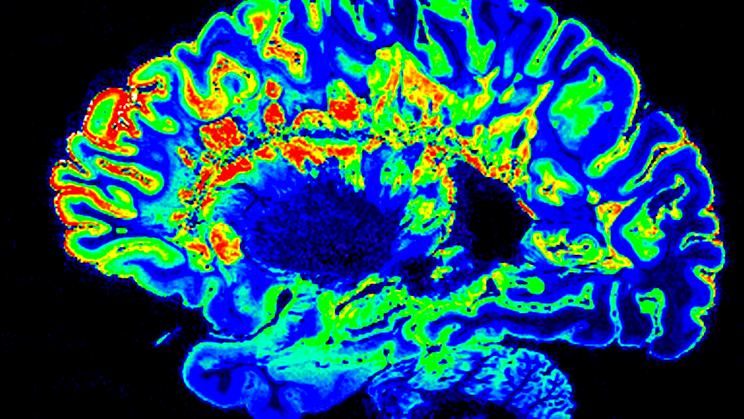Brigham and Women’s Hospital in Boston Massachusetts will soon begin Phase I trials of a nasal vaccine designed to prevent or slow the progression of Alzheimer’s disease (AD), a press release said. This is the first occasion when a nasal vaccine is being attempted for the disease, which affects more than six million people in the U.S. alone.
First seen in a patient way back in 1906 by Dr. Alois Alzheimer, the disease is a brain disorder characterized by the presence of clumps (amyloid plaques) and tangled fibers (tau tangles) between nerve cells (neurons) in the brain. Symptoms of the disease, which is usually seen in adults in their 60s, vary from memory issues to vision loss and even impaired reasoning.
The cause of the disease has long been questioned and researchers only recently believed to have come to the root of it. Research for a cure has been ongoing for decades, however, most interventions are aimed at reducing the severity of the symptoms. The vaccine to be trialed aims to change this.
The nasal vaccine trial
Howard L. Weiner, co-director of a center that studies neurological disease at Brigham has been researching the development of AD for over 20 years. Previous studies have shown that the immune cells in the body play a role in the removal of the amyloid plaques from the brain. Therefore, the researchers are using an immune modulator called Protollin to stimulate the immune system and remove the plaques.
Protollin is an intranasal agent derived by mixing specific cell components of different bacteria and is already used as an adjuvant, to generate greater immune response for other vaccines. The researchers are hopeful that by triggering the immune system, specifically the white blood cells from the lymph node located in the neck area, the vaccine will clear out plaques in AD patients too.
The trial will include 16 participants between the age of 60 and 85 years who have been diagnosed with symptomatic, early-stage AD, the press release said. Trial participants will receive two doses of the vaccine, one week apart. The main aim of the trial is to determine if the vaccine is safe and can be tolerated at the dosages planned. If successful, the same mode of treatment could be used for other neurodegenerative diseases, the press release said.
Interestingly, another possible treatment and vaccine strategy for AD was published earlier this month and will move to human trials soon.
News
Catching COVID significantly raises the risk of developing kidney disease, researchers find
Catching Covid significantly raises the risk of developing deadly kidney disease, research has shown. The virus was found to increase the chances that patients will develop the incurable condition by around 50 per cent. [...]
New Toothpaste Stops Gum Disease Without Harming Healthy Bacteria
Researchers have developed a targeted approach to combat periodontitis without disrupting the natural balance of the oral microbiome. The innovation could reshape how gum disease is treated while preserving beneficial bacteria. The human mouth [...]
Plastic Without End: Are We Polluting the Planet for Eternity?
The Kunming Montreal Global Biodiversity Framework calls for the elimination of plastic pollution by 2030. If that goal has been clearly set, why have meaningful measures that create real change still not been implemented? [...]
Scientists Rewire Natural Killer Cells To Attack Cancer Faster and Harder
Researchers tested new CAR designs in NK-92 cells and found the modified cells killed tumor cells more effectively, showing stronger anti-cancer activity. Researchers at the Ribeirão Preto Blood Center and the Center for Cell-Based [...]
New “Cellular” Target Could Transform How We Treat Alzheimer’s Disease
A new study from researchers highlights an unexpected player in Alzheimer’s disease: aging astrocytes. Senescent astrocytes have been identified as a major contributor to Alzheimer’s progression. The cells lose protective functions and fuel inflammation, particularly in [...]
Treating a Common Dental Infection… Effects That Extend Far Beyond the Mouth
Successful root canal treatment may help lower inflammation associated with heart disease and improve blood sugar and cholesterol levels. Treating an infected tooth with a successful root canal procedure may do more than relieve [...]
Microplastics found in prostate tumors in small study
In a new study, researchers found microplastics deep inside prostate cancer tumors, raising more questions about the role the ubiquitous pollutants play in public health. The findings — which come from a small study of 10 [...]
All blue-eyed people have this one thing in common
All Blue-Eyed People Have This One Thing In Common Blue Eyes Aren’t Random—Research Traces Them Back to One Prehistoric Human It sounds like a myth at first — something you’d hear in a folklore [...]
Scientists reveal how exercise protects the brain from Alzheimer’s
Researchers at UC San Francisco have identified a biological process that may explain why exercise sharpens thinking and memory. Their findings suggest that physical activity strengthens the brain's built in defense system, helping protect [...]
NanoMedical Brain/Cloud Interface – Explorations and Implications. A new book from Frank Boehm
New book from Frank Boehm, NanoappsMedical Inc Founder: This book explores the future hypothetical possibility that the cerebral cortex of the human brain might be seamlessly, safely, and securely connected with the Cloud via [...]
Deadly Pancreatic Cancer Found To “Wire Itself” Into the Body’s Nerves
A newly discovered link between pancreatic cancer and neural signaling reveals a promising drug target that slows tumor growth by blocking glutamate uptake. Pancreatic cancer is among the most deadly cancers, and scientists are [...]
This Simple Brain Exercise May Protect Against Dementia for 20 Years
A long-running study following thousands of older adults suggests that a relatively brief period of targeted brain training may have effects that last decades. Starting in the late 1990s, close to 3,000 older adults [...]
Scientists Crack a 50-Year Tissue Mystery With Major Cancer Implications
Researchers have resolved a 50-year-old scientific mystery by identifying the molecular mechanism that allows tissues to regenerate after severe damage. The discovery could help guide future treatments aimed at reducing the risk of cancer [...]
This New Blood Test Can Detect Cancer Before Tumors Appear
A new CRISPR-powered light sensor can detect the faintest whispers of cancer in a single drop of blood. Scientists have created an advanced light-based sensor capable of identifying extremely small amounts of cancer biomarkers [...]
Blindness Breakthrough? This Snail Regrows Eyes in 30 Days
A snail that regrows its eyes may hold the genetic clues to restoring human sight. Human eyes are intricate organs that cannot regrow once damaged. Surprisingly, they share key structural features with the eyes [...]
This Is Why the Same Virus Hits People So Differently
Scientists have mapped how genetics and life experiences leave lasting epigenetic marks on immune cells. The discovery helps explain why people respond so differently to the same infections and could lead to more personalized [...]





















